15 years of Lukashenka’s dictatorship
50- 10.07.2009, 9:56
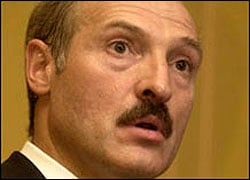
Today marks 15 years of Alyaksandr Lukashenka’s coming to power in the presidential election. Since that time he held several illegal referendums and usurped power.
In a year after Lukashenka’s rise to power, in 1995 on his order special services men beat up deputies of the Supreme Council of the 12th convocation of the Belarusian Popular Front faction. Parliamentarians announced a hunger strike protesting against holding the referendum on changing the state symbols and recognizing Russian as the official language.
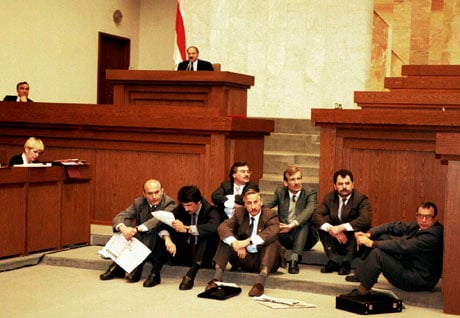
In November 1996 the only legal legislative body of the modern Belarus, the Supreme Council of the 13th convocation. The powers of the deputies, who had been elected by people for 5 years, were stopped by Lukashenka. Since that time a decorative organ, “chamber of representatives”, works in the country. Its first members were former deputies of the Supreme Soviet, who submitted applications to Lukashenka with a request to make them “parliamentarians”.
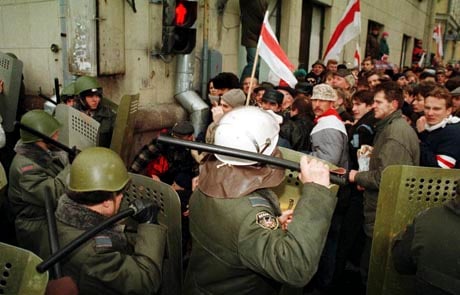
At the same time the regime’s opponent Viktar Hanchar was removed from the post of the chairman of the Central Election Commission. Other opposition leaders disappeared in the country: former Internal Affairs Minister Yury Zakharanka, a businessman and public leader Anatol Krasouski and a journalist Zmitser Zavadski went missing without traces. The world community suspects the Belarusian authorities in being involved in their abductions.
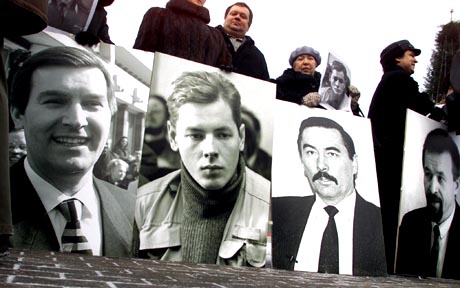
Since 1996 all election campaigns in Belarus were recognized by international structures not free and undemocratic. The chairperson of the Central Election Commission Lidziya Yarmoshyna was banned entry to the countries of the EU and to the US for rigging election results.
Over the years of Lukashenka’s rule independent mass media have been destroyed in Belarus: there is not a single independent TV channel here, all radio stations in FM range are subordinate to the state, practically all independent newspapers have been closed or get to readers with difficulty.
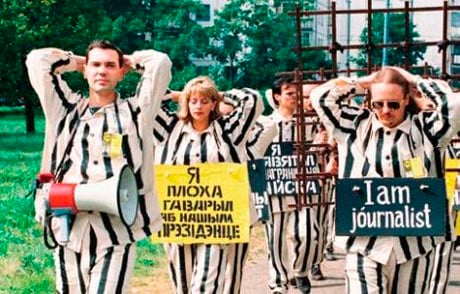
All peaceful protest rallies in the country are harshly cracked down on by force structures.

An armoured motor car in Minsk center before an opposition action (Minsk, March 25, 2000)

A soldier of special purpose task firing from a carbine at participants of the peaceful demonstration. This is most likely a carbine S-23 Selezen designed to shot rubber buckets and gas grenades. (Minsk, March 25, 2006)

Soldiers of special purpose squads beating women, who are trying to defend an injured participant of a peaceful protest demonstration (Minsk, March 25, 2006)
Over these 15 years hundreds of political prisoners have appeared in the country, dozens of thousands of people were repressed on political grounds.

“Over 15 years Lukashenka has developed in his ambition to preserve power. He has gained limitless powers, built strong power ministries, the establishment fears him,” stated the former chairman of the Supreme Council of Belarus Stanislau Shushkevich.
“First we were tolerant to manifestation of Lukashenka’s regime at an early stage, I mean his desire to strengthen personal power, dictatorial ambitions, building a totalitarian system fro the first days. We gave advance to the newly elected president, as the first democratic election in the history of Belarus took place in 1994. But then that system started to work against the nation effectively.
Ruthless crackdown on the opposition started. One can recall disappearances of Viktar Hanchar, Yury Zakharanka, Anatol Krasouski and the mysterious death of Henadz Karpenka. Then Lukashenka started to get support from the West suddenly. The “new policy” of Europeans hasn’t started today. Europeans always wanted to establish relations with Lukashenka’s regime (not the European Union as a whole, but certain countries). They fed the dictator with credits, developed trade and economic relations, supported transit role of Belarus. He used the international situation around Belarus rather successfully, and undoubtedly “milked” Russia.
But now the system has run out of steam. The crisis which is progressing now, is exposing all the problems of the political system of Belarus, makes people act more decisively. When people would be fired, their salaries and pensions cut, they won’t wait without complaint for the situation to become worse. It is to bring about pressure on the today’s political system inevitably,” believes the leader of the civil campaign “European Belarus” Andrei Sannikov.










